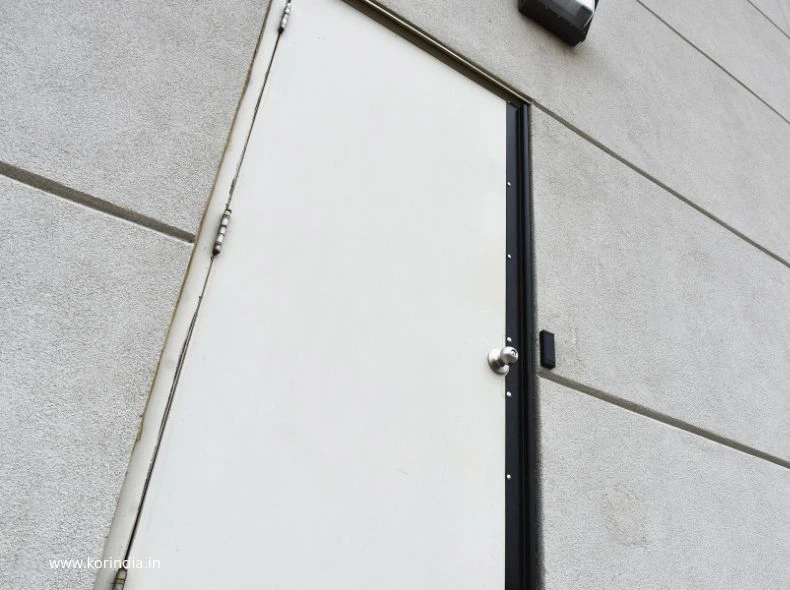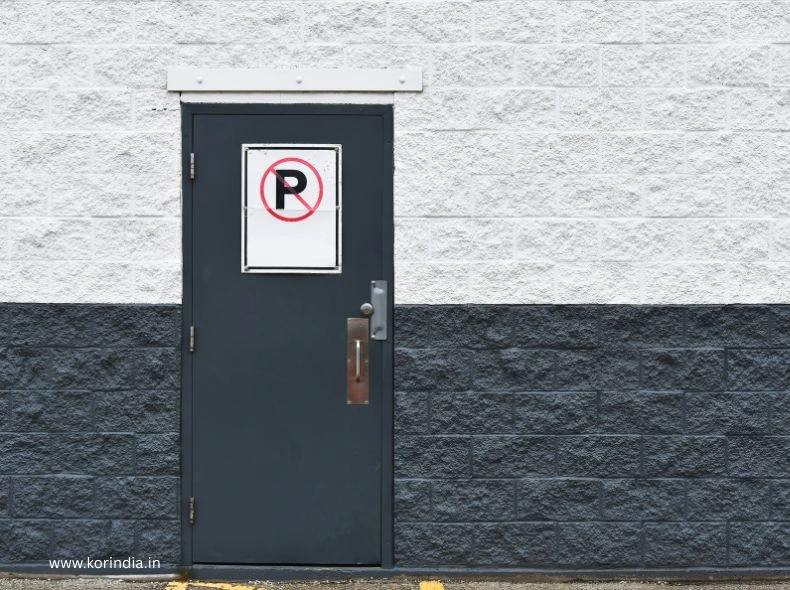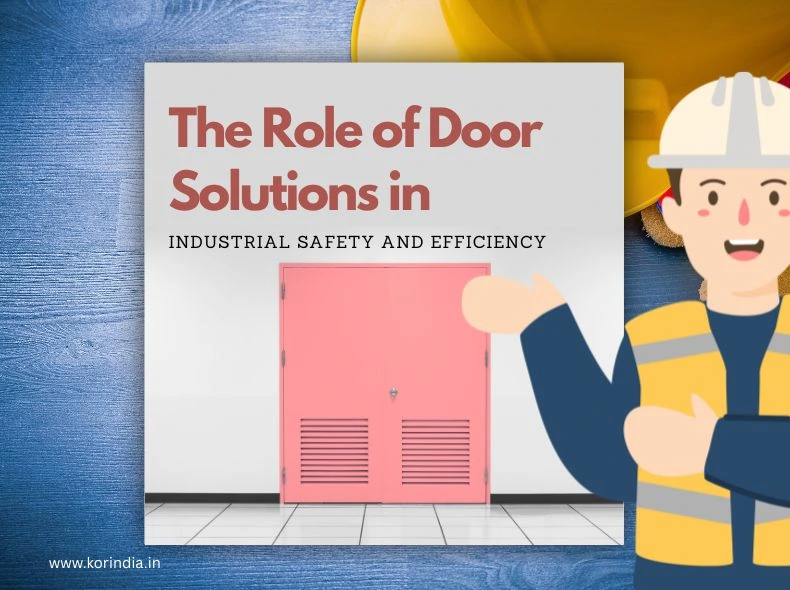Introduction: Doors That Drive Safety and Productivity
In industrial environments, doors are far more than mere entryways-they are foundational elements that directly affect operational safety, workflow efficiency, environmental control, and regulatory compliance. A well-chosen industrial door solutions not only protects your people and assets but also streamlines processes, lowers energy consumption, and supports a safe working environment.
Industrial facilities-from manufacturing plants and warehouses to pharmaceutical labs and logistics hubs-demand doors engineered to meet rigorous standards. This blog delves into the essential roles industrial doors play, reviews key door types, highlights benefits, and offers expert guidance for selecting and maintaining doors that enhance safety and efficiency.

Why Door Solutions Matter in Industrial Settings
1. Safety: The Non-Negotiable Priority
Industrial facilities often house combustible materials, hazardous chemicals, and heavy machinery. Here, doors serve as vital safety barriers:
- Fire Containment: Fire-rated doors help isolate fire zones, preventing flames and smoke from spreading rapidly, thus saving lives and minimizing property damage.
- Hazard Control: Certain doors restrict access to hazardous zones, protecting untrained personnel from exposure.
- Impact Resistance: Durable doors withstand collisions with forklifts, vehicles, or equipment, protecting both infrastructure and workers.
Example: In a chemical manufacturing plant, fire-rated steel doors with intumescent seals prevent the spread of fire and toxic smoke, ensuring safe evacuation.
2. Efficiency: Keeping Operations Flowing
Operational speed and reliability are critical to industrial productivity:
- Quick Access: High-speed doors open and close rapidly to accommodate fast-moving workflows.
- Automation: Automated doors reduce manual labor, speeding up material handling and improving safety by minimizing human error.
- Reduced Downtime: Well-maintained doors prevent jams or failures that could halt production lines.
3. Environmental Control: Cost Savings and Quality Assurance
Industrial doors play a significant role in controlling environmental factors critical to process quality and energy use:
- Temperature Regulation: Insulated doors help maintain precise temperatures in cold storage or manufacturing zones.
- Humidity Control: Proper sealing prevents moisture ingress, protecting sensitive products and machinery.
- Airflow Management: In cleanrooms or labs, doors help maintain positive or negative pressure zones to prevent contamination.
4. Compliance: Meeting Regulatory and Industry Standards
Strict regulations govern industrial safety, making compliance mandatory:
- Fire Safety Codes: Doors must meet fire resistance certifications such as IS 3614 (India), NFPA 80 (USA), or BS 476 (UK).
- Occupational Safety: Door design and operation must adhere to workplace safety laws to protect employees.
- Energy Codes: Doors contribute to meeting energy efficiency standards like LEED or local building codes.

Types of Doors for Industrial Safety and Efficiency
1. Fire-Rated Doors: The Backbone of Fire Safety
Purpose: Prevent fire and smoke from spreading, protecting occupants and assets.
Features:
- Certified fire resistance up to 2 hours or more.
- Intumescent and smoke seals to block gases.
- Robust steel construction with fireproof coatings.
Applications: Chemical plants, warehouses, manufacturing floors.
Case in Point: A large warehouse uses fire-rated doors to segment storage areas, ensuring that a fire in one section does not jeopardize the entire inventory.
2. High-Speed Doors: Maximizing Workflow Efficiency
Purpose: Facilitate fast, reliable access in busy areas requiring frequent door cycles.
Features:
- Rapid open/close cycles (often under 2 seconds).
- Tight seals to reduce energy loss.
- Automated sensors for hands-free operation.
Applications: Cold storage facilities, logistics centers, production lines.
Example: In a cold storage facility, high-speed doors maintain temperature stability while enabling quick product movement, improving throughput.
3. Sectional Doors: Space-Saving and Insulated
Purpose: Provide durable, insulated barriers while conserving space.
Features:
- Doors roll or slide vertically, not swinging outward.
- Insulated panels maintain thermal control.
- Heavy-duty hardware for frequent use.
Applications: Loading docks, garages, distribution centers.
4. Steel Doors: Security and Longevity
Purpose: Provide robust security and withstand harsh environments.
Features:
- Impact resistant steel frames and panels.
- Options with soundproofing and fire resistance.
- Low maintenance requirements.
Applications: Secure areas, industrial entryways, exterior doors.
5. Cleanroom Doors: Critical for Sterile Environments
Purpose: Maintain contamination-free zones with airtight seals and hygienic surfaces.
Features:
- Airtight, seamless seals compatible with pressure systems.
- Smooth, easy-clean surfaces.
- Often automated for minimal touch.
Applications: Pharmaceutical labs, semiconductor manufacturing, food processing.
Benefits of High-Quality Industrial Doors
Enhanced Safety
Reduce workplace accidents and unauthorized access through durable, compliant doors.
Increased Operational Efficiency
Automated and rapid doors optimize material flow and employee movement.
Significant Energy Savings
Maintain climate control with insulated and well-sealed doors, cutting utility bills.
Reduced Maintenance Costs
Premium doors built for heavy use require fewer repairs, reducing downtime.

Key Considerations When Choosing Industrial Doors
Specific Operational Needs
- Safety: Fire-rated, impact-resistant, or contamination control.
- Speed: High-speed or automated doors for rapid workflows.
- Environment: Insulation and sealing for temperature-sensitive operations.
Materials and Durability
- Steel: Heavy-duty strength and fire resistance.
- Fiberglass: Corrosion resistance in wet or chemical-exposed areas.
- Aluminum: Lightweight options for specific applications.
Automation and Integration
Automated doors with sensors and remote controls reduce manual intervention and increase safety.
Compliance Assurance
Ensure doors are certified to local and international standards for fire safety, workplace health, and energy efficiency.
Maintenance Tips for Industrial Doors
- Routine Inspections: Check door alignment, hardware, seals, and automation every 6–12 months.
- Cleaning: Remove dirt from tracks and hinges to prevent jams.
- Lubrication: Apply appropriate lubricants to moving parts.
- System Testing: Regularly test sensors, motors, and remote controls.
- Seal Replacement: Replace worn seals promptly to maintain airtightness.
Common Myths About Industrial Doors
- Myth: All industrial doors are the same.
Reality: Doors are engineered differently to meet diverse operational challenges. - Myth: Automated doors are unreliable.
Reality: With quality manufacturing and regular maintenance, automated doors are highly reliable. - Myth: Fire-rated doors are prohibitively expensive.
Reality: Initial costs are offset by property protection, regulatory compliance, and insurance savings.
Why Choose KORINDIA for Industrial Door Solutions?
KORINDIA stands at the forefront of industrial door innovation, combining Korean technology with Indian craftsmanship to offer:
- Customizable Doors: Tailored sizes, materials, and automation to fit your facility’s unique needs.
- Certified Safety: Fire-rated, cleanroom, and secure doors meeting global standards.
- Durability: Built to endure heavy traffic and harsh environments.
- Comprehensive Support: Expert consultation, installation, and maintenance services.
FAQs About Industrial Doors
Q1: Can industrial doors be customized?
A: Yes, KORINDIA offers bespoke options tailored to your operational requirements.
Q2: How often should doors be inspected?
A: Inspections every 6 to 12 months are standard, with more frequent checks in critical areas.
Q3: Are automated industrial doors energy-efficient?
A: Yes, they minimize energy loss by reducing door open times and ensuring tight seals.
Q4: What industries benefit most from cleanroom doors?
A: Pharmaceuticals, electronics manufacturing, and food processing rely heavily on cleanroom doors.
Conclusion: Doors That Deliver Safety and Efficiency
Industrial doors are critical to maintaining a safe, efficient, and compliant facility. From fire-rated barriers to high-speed access and cleanroom solutions, choosing the right doors from a trusted provider like KORINDIA ensures your operations remain smooth, secure, and sustainable.
Ready to enhance your industrial facility’s safety and efficiency?
Contact KORINDIA today for expert guidance and advanced door solutions tailored to your industry’s needs!

